Hussam al-Mahmoud | Khaled al-Jeratli | Muhammed Fansa
“There is no permanent anger or rivalry in politics,” following the aforementioned phrase uttered by the Turkish President, Recep Tayyip Erdogan, expressing the possibility of a future meeting that would gather him and the head of the Syrian regime, Bashar al-Assad, Turkey’s rapprochement with the Syrian regime is proceeding with Russian blessing, carrying almost daily statements by Turkish officials, along with a marathon state of political activity at ministerial levels and meetings at the level of intelligence services in closed chambers in order to reach a meeting gathering Erdogan with Assad.
After a rivalry that was set off by the Turkish support of the popular uprising and the reception of millions of Syrian refugees on its territory since the start of the revolution in 2011, Turkey is now moving towards a rapprochement with the Syrian regime at a pace weighed down by files accumulated over more than a decade, during which the facts of the revolution had changed along with the conditions of all parties concerned with the Syrian file, which also seeks to address its internal problems.
In this file, Enab Baladi discusses the image of a potential rapprochement and the dimensions of its impact, the files that can draw its limits, the benefits sought by the parties involved in this file, along with a more detailed American position on the Turkish move.
Political rapprochement, Is the field affected?
Since mid-2022, Turkish efforts to achieve rapprochement with the Syrian regime have accelerated, leading to a Russian-mediated meeting of the two sides’ defense ministers and their intelligence directors in Moscow on 28 December.
These features of a potential rapprochement have raised questions about the likelihood of its repercussions on the ground, especially in northern Syria, a Turkish sphere of influence in which Ankara supports anti-regime military factions within the Syrian National Army (SNA). Meanwhile, the areas held by the Syrian Democratic Forces (SDF) and Syrian regime forces are concentrated in Manbij, Tal Rifat, and Ayn al-Arab in the northern and eastern countryside of Aleppo.
Speaking to Enab Baladi, Turkish researcher and journalist Levent Kemal ruled out that the Syrian geography would be affected by the political rapprochement between Turkey and the regime, explaining that the current talks may not bring about change in the foreseeable term, especially under the conditions put forward by both parties (Turkey and the regime).
In Kemal’s view, the regime’s terms and the SDF file may hinder a settlement between the parties, despite the current discussions in this regard. The regime does not view this file as a priority. Rather, it considers these groups an “opponent willing to negotiate.”
US presence in the region also forces the regime to negotiate with the SDF, which includes Kurdish groups that raise Turkey’s concerns.
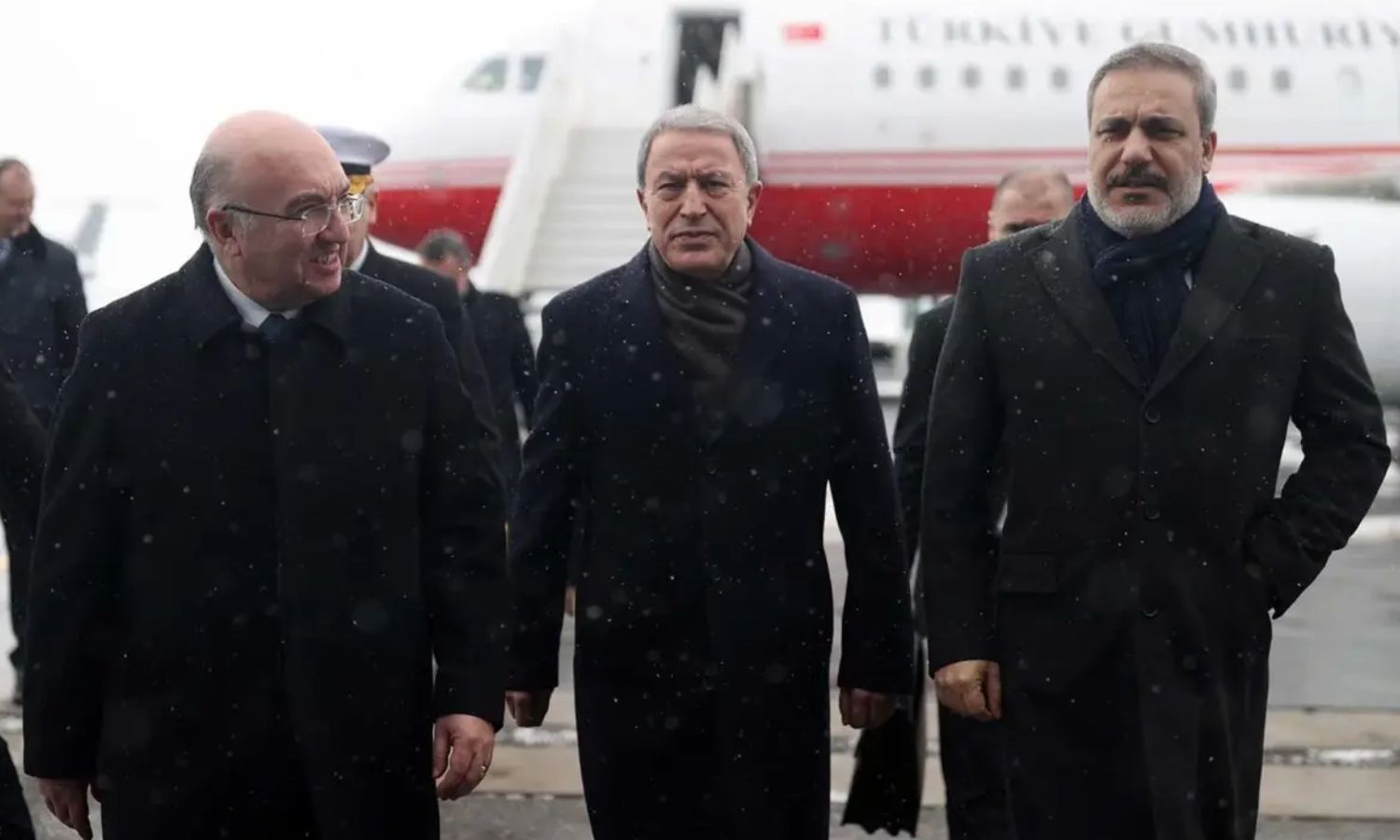
Turkish Defense Minister Hulusi Akar, and Head of Turkish National Intelligence Organization, Hakan Fidan, in Moscow, to attend the ministerial meeting with Russia and the Syrian regime – 28 December 2022 (Turkish Defense Ministry)
“We can talk about a real change in the facts if Turkey’s terms alone are questioned. But under the trilateral talks or the Assad – Erdogan meeting, all the parties are incapable of resolving the fundamental issues in Syria”, added Kemal.
In an article in Asharq al-Awsat newspaper, the former US Ambassador to Syria, Robert Ford, ruled out the possibility of field changes, particularly in SDF-held areas. He explained that the Americans would not leave unless Kurdish groups asked them to leave, especially since the Democratic Union Party (PYD), the SDF’s backbone, had managed to strike a balance between Washington on the one hand, and Damascus and Moscow, on the other, to deter any large-scale Turkish operation targeting the region.
Ankara has repeatedly hinted at launching a ground operation in northeastern Syria to remove the “SDF threat” from its borders, which was also met with US refusal and Russian attempts to dissuade Ankara from its stance.
The researcher specializing in Turkish affairs, Saeed al-Haj, also ruled out field-level near-term repercussions of the regime’s rapprochement with Turkey, especially in the areas where Turkish forces are deployed in northern Syria.
At the same time, al-Haj drew attention, during an interview with Enab Baladi, to possible changes in the regime’s deployment in northern Syria, given Moscow’s earlier proposals on the possible deployment of its military forces as a substitute for the SDF in the northern and eastern countryside of Aleppo, while ruling out Turkey’s facile abandonment of the gains it has achieved in its “counter-terrorism” strategy, says al-Haj.
In an opinion article published in Asharq al-Awsat newspaper on 30 December, the former Turkish Ambassador to Damascus, Ömer Önhon, explained that the Syrian conflict in 2022 had moved to a “new phase” in terms of the Damascus-Ankara relations.
The tripartite ministerial meeting in Moscow was also described by Önhon as “the start of a difficult process” and that it was the result of many problems that had accumulated over the past 11 years.
Saeed al-Haj told Enab Baladi that the “Moscow meeting” reflects the fact that Turkey and the regime have no problem with sitting at the table. However, indications are that both parties are taking a “pragmatic side” of the rapprochement.
Turkish Minister of Foreign Affairs, Mevlut Cavusoglu, previously said on 31 December 2022 that a tripartite meeting between the foreign ministers of Turkey, Russia, and Syria could be held in Moscow, or in a third country, mid-January, without specifying the name of the country, according to Turkish newspaper Hürriyet. However, he brought back up the topic and explained on 3 January that Moscow made a proposal to set a date, and Turkey is not ready on these dates, as the meetings will not be for one time or during one single day. Preparations had to be made until the Foreign Ministers’ meeting, he noted.
Turkish interest and Russia’s need for a “replacement”
The Turkish researcher and journalist Levent Kemal considered the Russian efforts to establish an agreement between Turkey and the Syrian regime as a reflection of Russia’s haste and the need for a party to fill the vacuum in Syria created by its invasion of Ukraine. At the same time, he pointed out that Ankara is not taking a very effective position in this regard because of its influence in northern Syria.
Dialogue with Damascus is needed to expand Turkey’s influence in Syria, although this plan is not entirely practical; although Turkey and Russia are currently close, Ankara cannot ignore that Moscow was at some point an “enemy,” according to Kemal.
Hassan al-Shaghel, a researcher at the Ayam Center for Studies, told Enab Baladi that the Russian push for Turkey’s normalization of its relations with the regime is in the service of Turkish economic interests. Moscow has put billions of dollars into Turkish banks to build a nuclear power plant, contributing to the relative stability of the Turkish lira.
Russia also allowed Turkey to pay a quarter of natural gas dues in Russian rubles to relieve pressure on the Turkish treasury’s US dollar reserves, while allowing the payment of gas dues to be postponed until after the elections.
Washington is unsupportive and moving on the ground
Enab Baladi spoke to the US State Department via email to inquire about the official position on the possible rapprochement between Turkey and the Syrian regime. In its reply, the US State Department called on states considering normalization with the “Assad regime” to carefully consider the horrific atrocities committed against the Syrian people over the past decade, along with the regime’s efforts to deny a large part of the country access to humanitarian aid and security.
The State Department also stressed that it did not support normalization efforts or the rehabilitation of “brutal dictator Bashar al-Assad,” stating that it would not upgrade its diplomatic ties with him, nor does it support the normalization of other countries’ ties with him.
The US State Department reiterated that the US will not lift sanctions imposed on the Syrian regime, saying that the US position opposing Syria’s reconstruction unless irreversible progress was made towards a political solution still stands.
The United States considers irreversible political progress to be a necessary and vital condition for reconstruction, explaining through its State Department that it has not seen progress in this aspect.
On what steps Washington could take to curb normalization with the Syrian regime, the US State Department sees Caesar Act as an important tool for lobbying for the accountability of the Assad regime, particularly with regard to its egregious record of human rights violations to the Syrian people.
| Stability in Syria and the region can only be achieved through a political process that represents the will of all Syrians. We are committed to working with allies, partners, and the United Nations to ensure that a lasting political solution remains within reach.
A US State Department source |
With regard to the attempt to draw new alliances for the future and their impact on northeastern Syria, the US State Department has stressed that its presence in Syria is intended to enable the campaign against the Islamic State (IS) that has not yet ended.
| We are committed to maintaining our limited presence in northeastern Syria as part of a comprehensive strategy to defeat ISIS and al-Qaeda by working with and through the Syrian Democratic Forces (SDF) and other local partners.
A US State Department source |
Anas Shawakh, a researcher at Jusoor for Studies center, argues that the US hides an “apprehension” of this rapprochement, especially as it is driven by Russian mediation. Shawakh told Enab Baladi that Washington’s intensified activities and strengthened presence in northeastern Syria demonstrated such concern.
The US-led International Coalition’s forces recently increased their activity in Syria’s eastern region by increasing military patrols in the region after having been reduced previously, according to Shawakh.
The redeployment of the US and Coalition forces in Raqqa is also an indicator in this context, especially since they withdrew from it since the coalition-backed SDF took control of the governorate in 2019, taking it from IS.
In mid-December 2022, the Kurdish Basnews website quoted an unnamed informed source in the SDF as saying that the International Coalition was building a new military base on the banks of the Euphrates River in the city of Raqqa.
According to the said source, the purpose of the base is “to conduct joint patrols with (SDF) on the road connecting al-Hasakah and Raqqa and the Tal Abyad road to monitor the situation in the area.”
Levent Kemal considered that the US position would be clearly taken only on the basis of future SDF movements, as its possible reconciliation with the regime might weaken the US position in the region relatively without affecting it entirely.
Researcher Saeed al-Haj considers that the ties between the regime and Turkey may not have important indications for the US, but what matters is that the rapprochement between the two parties is indicative of the solid ties between Ankara and Moscow, which may be a source of concern for Americans in a way that prompts them to adopt a clearer position.
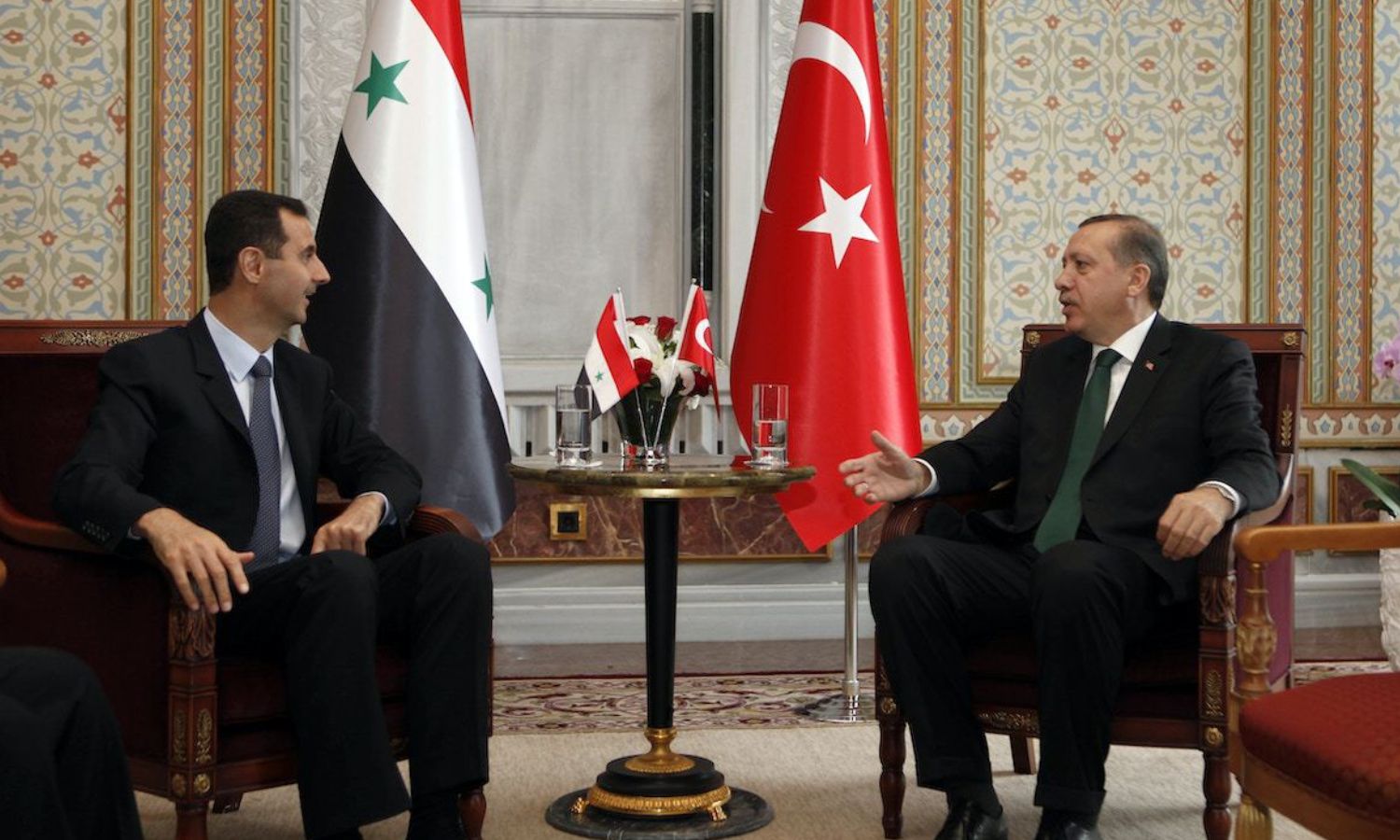
Turkish President Recep Tayyip Erdogan and the head of the Syrian regime, Bashar al-Assad, in Istanbul – 2010 (AFP)
Thorny files
Syrian North, Will it pay the price?
The tripartite ministerial meeting in Moscow was met with demonstrations at several points in the cities and towns of northwestern Syria, denouncing the Turkish statements about rapprochement with the regime and affirming the continuity of the revolution.
The demonstrations came in response to calls launched by activists and local pages, entitled “We die and do not reconcile with al-Assad,” during which the demonstrators recalled the regime’s violations over more than a decade, including killing, displacement, and arrest.
The fears of the people in northern Syria revolve around how the Turkish-influenced region will be impacted by future agreements or possible settlements between the regime and Ankara, such as eliminating the SDF threat and returning the Syrian refugees.
This was not the only time in which the northern region population expressed its rejection of the idea of rapprochement, as there were demonstrations on 12 August 2022, rejecting reconciliation with the regime, a day after statements made by Cavusoglu related to seeking reconciliation between the regime and the opposition.
At that time, statements of military leaders in the opposition factions followed, rejecting the idea of reconciliation.
According to an opinion poll conducted by Enab Baladi on its website and its social media platforms to find out people’s opinions about the possibility of Turkey’s rapprochement with the regime reflecting on the opposition’s areas of influence in northwestern Syria:
82% of the participants via the Enab Baladi’s website, and about 66% of the participants via Facebook, believe that the rapprochement has an impact on the North, while 18% of those who voted on the website, and about 33% of those who voted on Facebook, believe that the two sides converging will not have an impact on the opposition-held areas in northern Syria.
The Syrian regime calls on Turkey to withdraw from Syrian territory and stop its support for the opposition factions to restore bilateral relations.
On 29 December 2022, the Turkish Foreign Minister confirmed his country’s intention to hand over these lands to Syria when “political stability is achieved, and everything goes well in the country,” but currently there are “terrorist” organizations that cannot be controlled, as he described it.
On 3 January, Cavusoglu met with the leaders of the political opposition, represented by the Syrian National Coalition, the Syrian Interim Government, and the Syrian Negotiation Commission, affirming his country’s support for the opposition and the Syrian people, in accordance with Security Council Resolution 2254.
Similarly, on 24 August 2022, the Turkish minister held a similar meeting with opposition leaders as well, less than two weeks after demonstrations took place in the north in response to his talk about the need for reconciliation between the regime and the opposition.
In a video recording, on 2 January, under the title “We will not reconcile,” the leader of Hayat Tahrir al-Sham (HTS), Abu Mohammad al-Jolani, rejected the reconciliation and vowed to overthrow the regime and rebuild Damascus, considering the Turkish talks with the regime and its Russian ally “A dangerous deviation that affects the goals of the Syrian revolution.”
For his part, Salem al-Meslat, head of the Syrian National Coalition, stressed in a video speech after his meeting with the Turkish Foreign Minister on 4 January the revolution and opposition forces’ adherence to the principles of the revolution and the need to focus efforts to achieve a political transition in accordance with international resolutions.
He also warned against the continuous deception practiced by the regime to procrastinate and continue its violations against the Syrians.
Crossings, a Turkish card
In light of the suffocating economic crisis that the areas under the regime’s control are going through, the Syrian opposition fears that the path of normalization between Turkey and the regime will take an upward turn during 2023 and that the opening of international roads and internal crossings for the movement of Turkish goods will be the first sign of normalization between the two sides, which is what the Syrian regime seeks.
Against the background of the tripartite ministerial meeting, al-Watan newspaper, which is close to the regime, said that there was agreement on Turkey’s withdrawal from northern Syria and the implementation of the 2020 agreement between Russia and Turkey regarding the opening of the international M4 highway.
On 2 January, Middle East Eye news site quoted a Turkish source, who it described as “an insider,” without naming it, that the meeting in Moscow did not result in any decisions or agreements.
The factions had previously prepared the Abu al-Zindayn crossing near the city of al-Bab in the northern countryside of Aleppo for opening on 20 September 2022, under direct Turkish supervision, and control of it was transferred to the Sultan Murad Division, known for its Turkish affiliation, at the expense of the Third Corps in the Turkish-backed National Army during the October 2022 battles with Hayat Tahrir al-Sham.
The Syrian regime is the biggest beneficiary if the M4 highway is reopened, which would allow it to obtain the materials it needs from Turkey, and revive the movement of trade, import, and export for the regime with Iraq, as the road extends to the al-Yarubiyah crossing located on the Syrian-Iraqi border, academic researcher Hassan al-Shaghel said.
For its part, the HTS, in September 2022, prepared the Saraqib crossing in the eastern countryside of Idlib, removed the barriers, and completely dominated the lines of contact with the regime on both sides of the crossing after it expelled the Sham Legion.
The crossing has already received a number of humanitarian aid convoys coming, according to the cross-line mechanism, from the regime-controlled areas during the year 2022, without any change since that time.
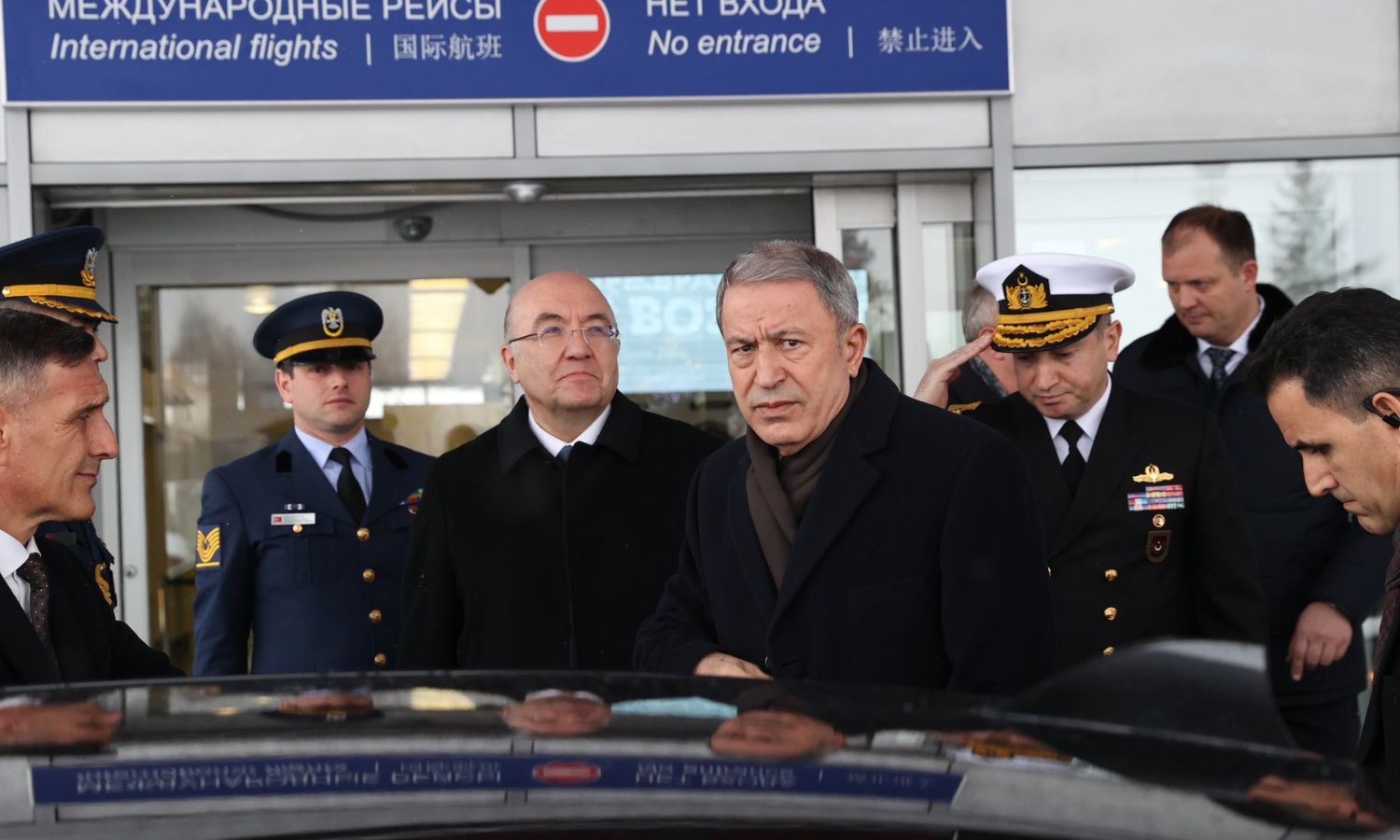
Turkish Defense Minister Hulusi Akar in Moscow to participate in the tripartite ministerial meeting with Russia and the Syrian regime – 28 December 2022 (Turkish Defense Ministry)
Refugees return linked to “amnesty”
On 29 December 2022, the Turkish newspaper, Habertürk, reported that the tripartite ministerial meeting in Moscow discussed a Russian proposal to implement the Lebanese or Jordanian experience with regard to the refugee return file to start as of next February, but the regime asked for more time.
The refugee file is considered one of the most prominent “cards” of the various Turkish parties to attract the Turkish street before the presidential elections scheduled for the middle of this year.
Since May 2022, Turkish President Recep Tayyip Erdogan has announced his government’s intention to “voluntarily” return one million Syrian refugees to their country.
This declaration was followed, in October of the same year, by statements by the Turkish presidential spokesperson, Ibrahim Kalin, during which he stressed the lack of trust of the Syrian refugees on Turkish lands and the Syrians in the areas where Turkish forces are present in the north, in the regime, stressing that they are right to do so.
Turkish journalist Esra Ozturk refused, via email correspondence with Enab Baladi, to compare the return of Syrian refugees from Turkey to the Lebanese or Jordanian experience since the numbers there are fewer and the living conditions are different than in Turkey, explaining that the return from Turkey may be “a little more difficult.”
Ozturk attributed the regime’s request for more time to accept the return of refugees from Turkey to “preparing a general amnesty decree for the returnees.”
According to the Turkish journalist, Ankara knows that the regime did not abide by the previous “amnesty” decrees it issued, but the regime realizes that no future “amnesty” decision can be exploited or violated if it takes place with a Turkish and Russian guarantee.
According to the annual report of the Syrian Network for Human Rights (SNHR), all the “amnesty” decrees released 7,351 detainees, and the regime still has about 135,253 forcibly disappeared detainees.
In August 2022, the Türkiye newspaper published a report on Ankara’s desire to make the cities of Homs, Damascus, and Aleppo experimental areas for the “safe and voluntary” return of Syrian refugees in the first phase, with the possibility of expanding the areas, ensuring the refugees’ safety, returning their property, and granting them their personal rights.
The statements pushing for the normalization of relations with the regime were also accompanied by “assurances” recently launched by the Turkish Ministers of Foreign Affairs and Defense to the effect that the Syrians in Turkey and northern Syria would not be subjected to any violation or put them in any predicament.
Uprooting SDF, common interest
In conjunction with its air operation, which was called “Claw-Sword,” on 20 November 2022, targeting sites within the influence of the SDF, Turkey is constantly threatening to launch a ground operation in the same area.
The “seriousness” of the Turkish threat of military action was increased by Ankara accusing the SDF (it considers it an extension of the banned PKK in Turkey) of standing behind the bombing that hit Istiklal Street in Istanbul on 13 November 2022, which the latter denied.
Ozturk explained that dealing with the SDF file would bring the regime closer to the oil fields it controls, and therefore the regime’s agreement with Turkey and reaching a settlement with the opposition would give the regime Turkish support for its control of the SDF areas.
According to Ozturk, the “Turkish transformation” comes after Ankara realized that the American support for the SDF will not end, and therefore it wants to develop a strategy summed up by establishing an alliance to expel the SDF from northeastern Syria.
For years, Moscow has been encouraging Turkish-Syrian normalization on the basis of the Adana agreement between the two countries of 1998, allowing Turkey to pursue “terrorists” in Syria while preserving “Syrian sovereignty” as an alternative solution to the Turkish operation.
On 4 January, the Turkish Minister of Defense, Hulusi Akar, announced the possibility of conducting joint Turkish-Russian patrols in northern Syria, in a move that Ozturk interpreted as the beginning of the establishment of multilateral strategic cooperation between the Turkish, Syrian, and Russian forces.
What interest? And what next?
The Turkish rapprochement with the Syrian regime is not limited to the two sides only but is related to the parties concerned with the Syrian file, which are closely following the developments of the file.
In addition to the regime, which is eager to end its isolation, and the Turkish government, which extracted the files of refugees and normalization with the regime from the tusks of the Turkish opposition parties, there is also a Russian mediator who has been playing the role of the regime’s “savior ally” for years, in addition to an Iranian role that cannot be ignored in Syria, especially in light of the efforts to enhance a possible Turkish presence there, with Russian push.
Mustafa al-Nuaimi, an expert on Iranian affairs, explained to Enab Baladi that Tehran’s policy is based on the absence of a state in Syria, despite its domination of decision-making, but at the same time, it is preoccupied with its internal problems and the protests it has been experiencing for months.
Al-Nuaimi added that Iran fears any future Turkish-Syrian rapprochement and is trying to impose its presence in the Syrian file by putting pressure on the regime, as it sees Turkey as the most prominent competitor in Syria in light of the current developments, which is definitely contrary to its interests.
As for the prospects for Turkish rapprochement with the regime, al-Nuaimi questioned the regime’s ability to provide what is beneficial to Ankara, given that Iran has a role and a word as well, in comparison to the case of southern Syria, whose settlements Russia pledged to supervise and to protect those wishing to remain within their areas, but Iran is constantly seeking to penetrate there.
Al-Nuaimi considers that the damage that might result from Turkey’s rapprochement with the regime outweighs the potential Turkish gains, especially with the lack of American or international welcome.
Regarding the reasons for the acceleration of political and diplomatic activity in order to culminate in rapprochement, the researcher at the Higher Institute of International Studies in Geneva, Bilal al-Salaimeh, explained to Enab Baladi that the rapprochement is driven by two main factors.
The first is Russian pressure in this direction, specifically from Russian president Vladimir Putin, due to his personal relationship with the Turkish president. Most of Erdogan’s statements in this regard and the ongoing contacts came on the return plane from Moscow or after a phone call with Putin, and this coincidence is meaningful.
The second factor is the approaching elections and the opposition playing on this chord, and the Turkish government is concerned with withdrawing the file from the hands of the opposition, in addition to the existence of an indirect factor related to the decline in the Syrian revolution and the decline in international interest in the Syrian file, especially with the current focus on the Ukrainian file, and the futility of the Geneva political process, obstructing the work of the Syrian Constitutional Committee (SCC), and other reasons that collectively stirred the winds of rapprochement.
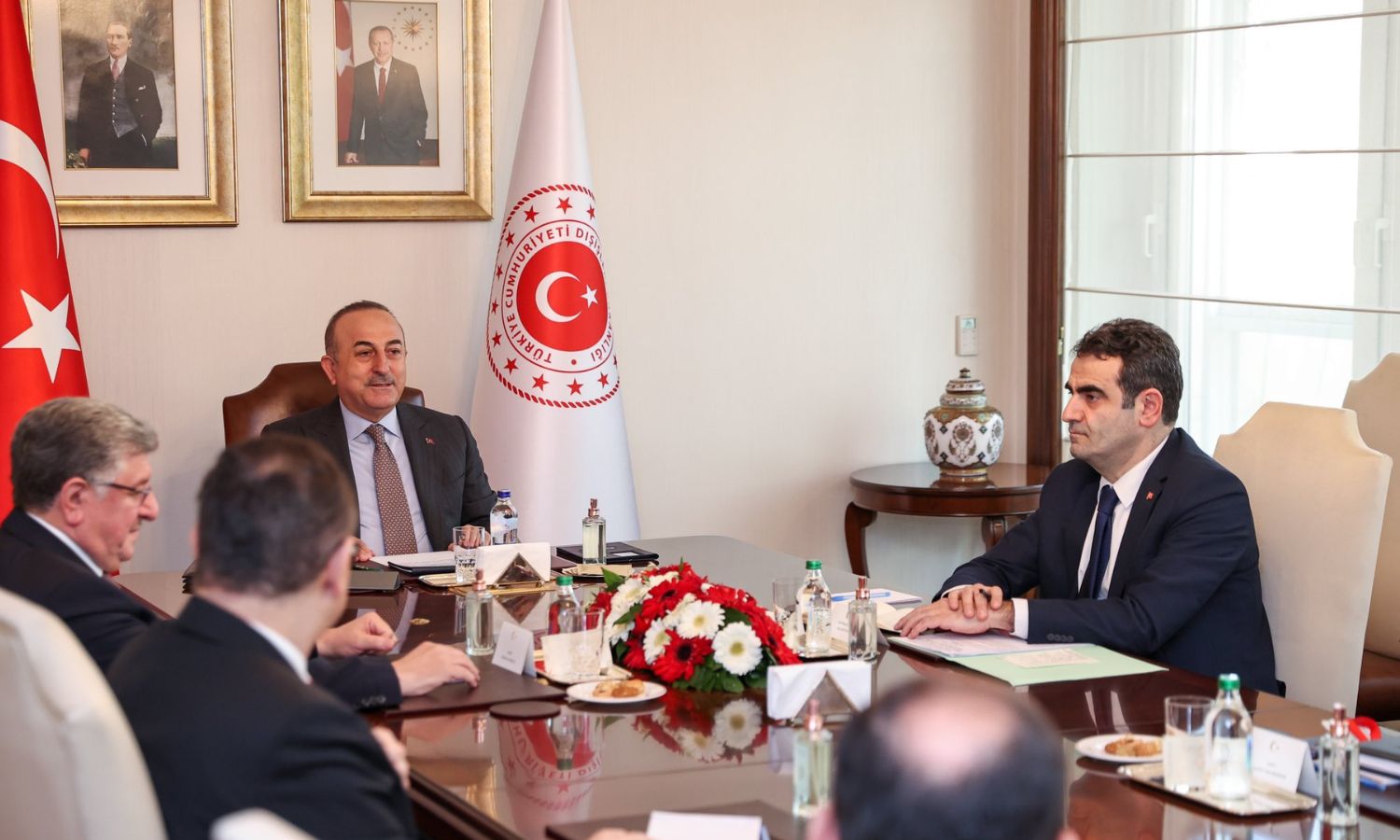
Turkish Foreign Minister Mevlut Cavusoglu meets opposition leaders on 3 January 2023 (Cavusoglu’s Twitter account)
Regarding the interest of the concerned parties, al-Salaimeh stressed that the first beneficiaries, in addition to the regime, are Russia and Iran. Moscow is interested in floating the regime, and Russia and Iran are interested in cooperation between Turkey and the regime, especially in the east of the Euphrates, to try to put pressure on the American presence there.
|
The (Astana) trio have a common interest in expelling America from the east of the Euphrates, and therefore the future rapprochement provides a triple benefit, especially for Iran and Russia, to put pressure on the American side. Dr. Bilal al-Salaimeh Researcher at the Institute of International Studies in Geneva |
Al-Salaimeh also considered that the future of rapprochement between the two sides is fruitless in the short term for two reasons.
The first is related to the regime’s desire for rapprochement, as it is not interested in the process in light of the presence of the current Turkish government, and it may be present in the talks under direct Russian pressure, but it is concerned with security cooperation with Turkey, not the political file.
The regime is looking forward to the possibility of a change at the political level in Turkey, which may facilitate dealing with any government that could replace Erdogan’s government or the Justice and Development Party.
As for the second reason for the futility of rapprochement, it is evident that Turkey wants the regime to deal with two issues, namely the return of the refugees and the provision of a safe environment for their return, and the issue of the east of the Euphrates, but the Syrian regime is unable to receive the refugees, and has no economic capabilities in this regard, according to al-Salaimeh.
In addition, the refugees themselves have no desire to return to the regime-controlled areas in light of the current security structure, and this was clearly reflected in Lebanon.
Despite great pressure from the Lebanese government and parties, and the deteriorating economic situation, only hundreds of Syrians have returned, which means that Turkey’s first goal is difficult to reach or achieve in the foreseeable future.
In the opinion of the researcher, with regard to expelling the SDF from the east of the Euphrates, this matter is not only answered by Ankara, Damascus, Moscow, and Tehran as it is also linked to the American presence in this region. The US is approaching this matter with clear reservation, whether through its presence on the ground or through statements, which means that there will be no fruitful rapprochement in the short term, and if the meetings continue, this will happen under Russian pressure on both sides.
During the past few years, the regime restored its relations with some Arab countries, such as the Emirates and Jordan, but these relations took two different paths as Abu Dhabi strengthened its relationship with the regime by opening its embassy in Damascus in 2018 and exchanging visits, and Assad made his first foreign visit to an Arab country since the outbreak of the Syrian revolution, in addition to supporting it on more than one level.
As for Jordan, despite its retraction of statements calling for al-Assad to step down, its re-receiving of the Syrian ambassador to Amman in 2018, and the mutual visits of economic delegations, it did not step beyond the economic aspirations that precede revitalizing relations politically. At the same time, it did not achieve a meeting between al-Assad and the Jordanian king, unlike the case with the Emirates.
In this context, al-Salaimeh does not like to compare the regime’s potential relations with Turkey with the regime’s relationship with Jordan or the Emirates, given that the dynamics and motives of each relationship are different.
if you think the article contain wrong information or you have additional details Send Correction
النسخة العربية من المقال
-
Follow us :













 Turkish President Recep Tayyip Erdogan and the head of the Syrian regime, Bashar al-Assad, in Istanbul 2009 (AFP)
Turkish President Recep Tayyip Erdogan and the head of the Syrian regime, Bashar al-Assad, in Istanbul 2009 (AFP)





 A
A
A
A
A
A
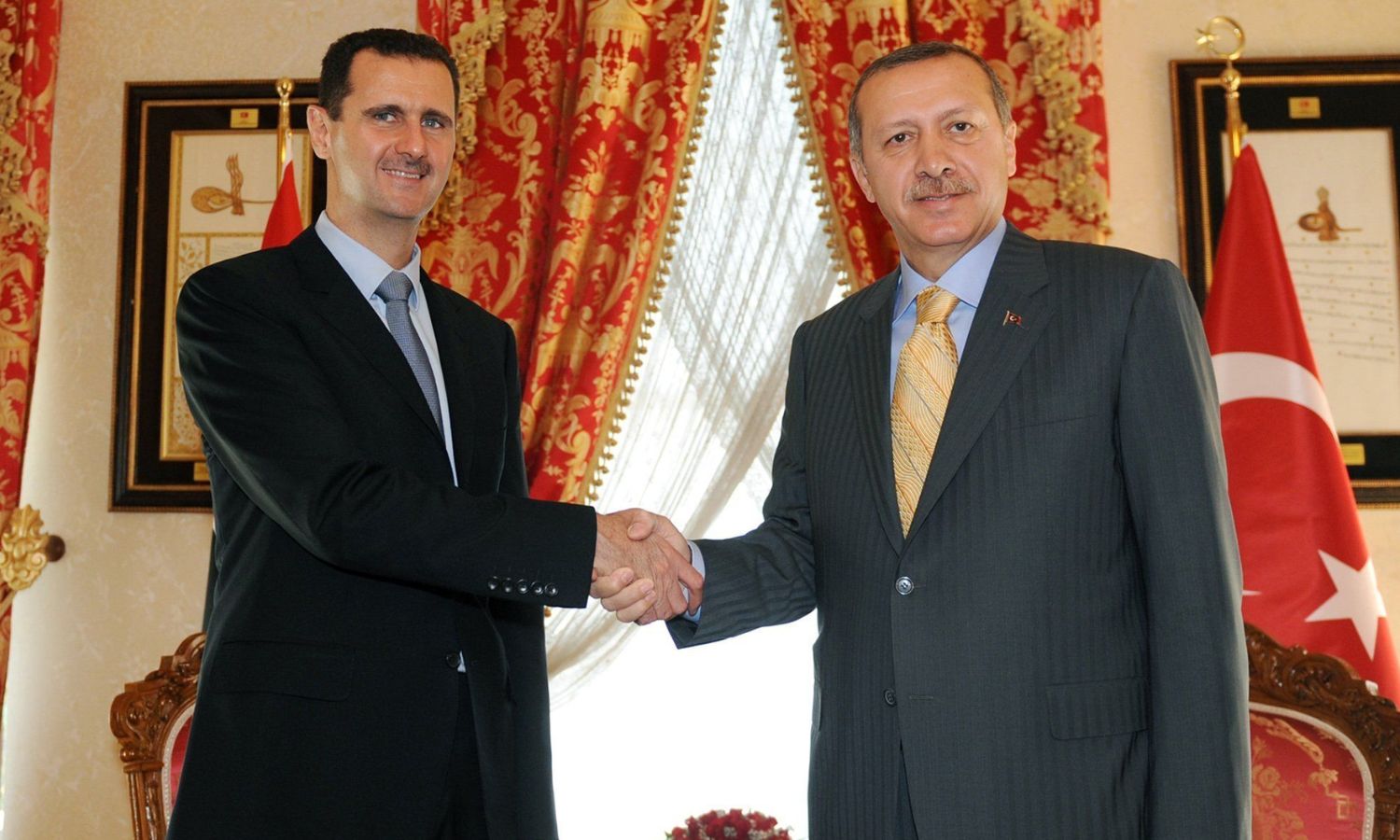


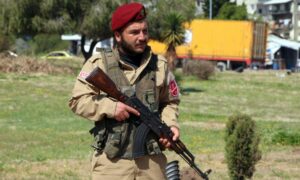

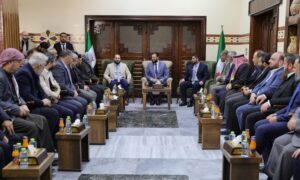
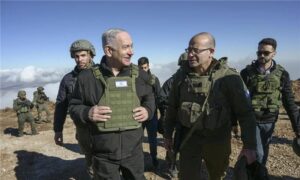
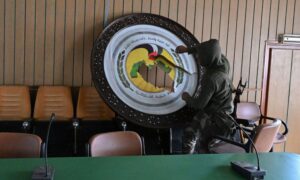
 More In-Depth
More In-Depth